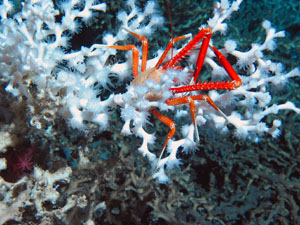Robertson Coral Reef Research & Conservation Program
 Our coral reefs are a barometer of the Earth’s health, and nowhere else on earth is biodiversity greater than in our coral reefs and rain forests. Coral reefs provide food, tourism revenue, coastal protection and the potential for new medicines for increasingly resistant diseases. Both our shallow and deep water coral reefs face a time of crisis, not only in the Caribbean, Florida and the Bahamas, but worldwide. Threats to shallow and deep coral reefs are many, including pollution, elevated temperatures resulting in coral bleaching and mortality, coral disease and destructive fishing practices.
Our coral reefs are a barometer of the Earth’s health, and nowhere else on earth is biodiversity greater than in our coral reefs and rain forests. Coral reefs provide food, tourism revenue, coastal protection and the potential for new medicines for increasingly resistant diseases. Both our shallow and deep water coral reefs face a time of crisis, not only in the Caribbean, Florida and the Bahamas, but worldwide. Threats to shallow and deep coral reefs are many, including pollution, elevated temperatures resulting in coral bleaching and mortality, coral disease and destructive fishing practices.
Yet despite the importance of shallow and deep coral reefs and their rapidly declining health, there is much yet to be understood, including their responses to environmental stressors, the nature and impact of diseases, their ability to recruit and their interrelationships with other animals and plants in the reef environment. A well-managed marine conservation program is an effective means of assuring healthy ecosystems while supporting tourism and fisheries. Managing and protecting coral reefs, with the intent to reverse their decline, requires good fundamental research on the corals, associated plants and animals and the whole reef ecosystem.
The Robertson Coral Reef Research & Conservation Program, supported primarily by the Banbury Foundation, is dedicated to understanding and preventing losses in shallow and deep water coral communities that result from both natural and anthropogenic causes. The Robertson Program is currently addressing two major themes: (1) Coral Reef & Molecular Ecology and (2) Coral Reef Discovery & Conservation.